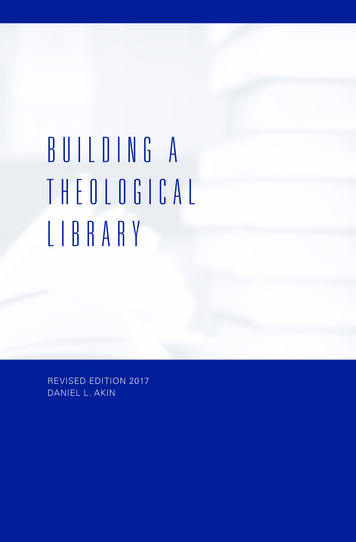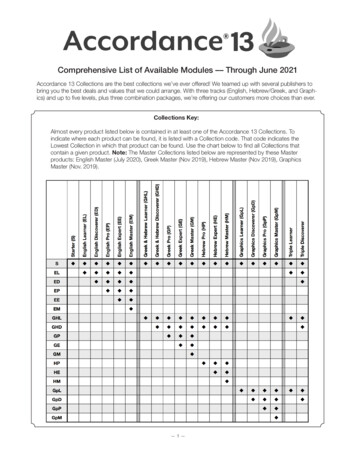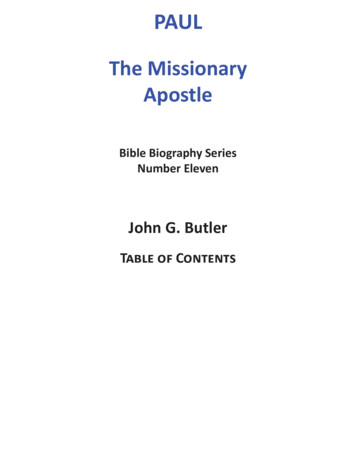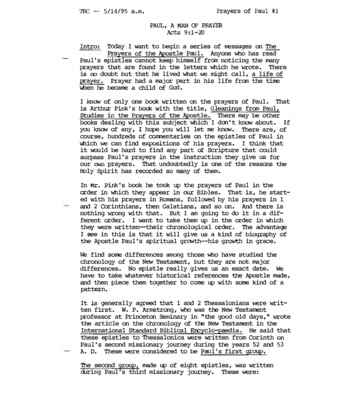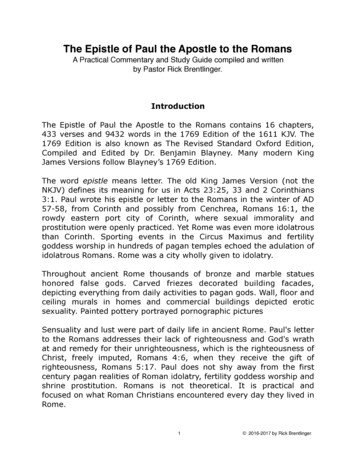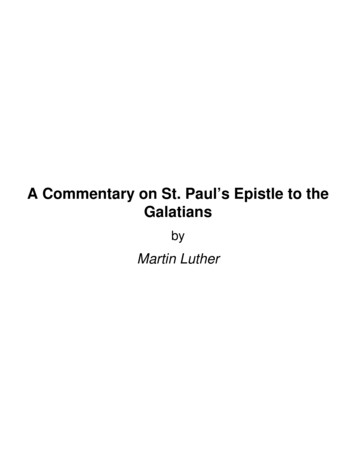
Transcription
A Commentary on St. Paul’s Epistle to theGalatiansbyMartin Luther
About A Commentary on St. Paul’s Epistle to the Galatians by Martin blication History:Print Basis:Source:Date Created:General Comments:Contributor(s):CCEL Subjects:LC Call no:LC Subjects:A Commentary on St. Paul’s Epistle to the .htmlLuther, Martin (1483-1546)Graebner, Theodore (Translator)Grand Rapids, MI: Christian Classics Ethereal LibraryThe importance of this Commentary on Galatians for the history ofProtestantism is very great. It presents like no other of Luther’s writingsthe central thought of Christianity, the justification of the sinner for thesake of Christ’s merits alone. We have permitted in the final revisionof the manuscript many a passage to stand which seemed weak andineffectual when compared with the trumpet tones of the Latin original.But the essence of Luther’s lectures is there. May the reader acceptwith indulgence where in this translation we have gone too far inmodernizing Luther’s expression—making him “talk American.”“The lectures which are preserved in the works herewith submittedto the American public were delivered in 1531. . . . A Germantranslation by Justus Menius appeared in the Wittenberg Edition ofLuther’s writings, published in 1539.” This translation and condensationpublished 1949.Grand Rapids: Zondervan [1939]Project Wittenberg1999-01-05Robert Smith (cosmithb@ash.palni.edu) has a letter from Zondervanstating that the copyright was not renewed and the book is in thepublic domain.Laura J. Hoelter (Transcriber)Wendy Huang (Markup)All; Classic; Bibles; Proofed;BS2685The BibleNew TestamentSpecial parts of the New TestamentPauline Epistles
A Commentary on St. Paul’s Epistle to the GalatiansMartin LutherTable of ContentsAbout This Book. . . . . . . . . . . . . .Title Page. . . . . . . . . . . . . . . . . .Preface. . . . . . . . . . . . . . . . . . . .From Luther’s Introduction, 1538. . .Galatians 1. . . . . . . . . . . . . . . . .Galatians 2. . . . . . . . . . . . . . . . .Galatians 3. . . . . . . . . . . . . . . . .Galatians 4. . . . . . . . . . . . . . . . .Galatians 5. . . . . . . . . . . . . . . . .Galatians 6. . . . . . . . . . . . . . . . .Indexes. . . . . . . . . . . . . . . . . . . .Index of Scripture References. . . .Index of Scripture Commentary. . .Index of Names. . . . . . . . . . . . .Index of Pages of the Print Edition.iii.p. iip. 1p. 2p. 4p. 5p. 24p. 47p. 81p. 104p. 128p. 137p. 137p. 138p. 138p. 139
A Commentary on St. Paul’s Epistle to the GalatiansMartin Lutheriv
GalatiansMartin LutherA Commentaryon St. Paul's Epistleto the GalatiansbyMartin LutherA New Abridged Translation byTHEODORE GRAEBNER, D.D.Professor of Philosophy and New Testament InterpretationConcordia Seminary, St. Louis, Missouri
GalatiansMartin LutherPREFACEiiiivTHE preparation of this edition of Luther’s Commentary on Galatians was first suggested to me byMr. P. J. Zondervan, of the firm of publishers, in March, 1937. The consultation had the twofoldmerit of definiteness and brevity.“Luther is still the greatest name in Protestantism. We want you to help us publish some leadingwork of Luther’s for the general American market. Will you do it?”“I will, on one condition.”“And what is that?”“The condition is that I will be permitted to make Luther talk American, ‘streamline’ him, soto speak—because you will never get people, whether in or outside the Lutheran Church, actuallyto read Luther unless we make him talk as he would talk today to Americans.”I illustrated the point by reading to Mr. Zondervan a few sentences from an English translationlately reprinted by an American publisher, of one of Luther’s outstanding reformatory essays.The demonstration seemed to prove convincing for it was agreed that one may as well offerLuther in the original German or Latin as expect the American church-member to read anytranslations that would adhere to Luther’s German or Latin constructions and employ theMid-Victorian type of English characteristic of the translations now on the market.“And what book would be your choice?”“There is one book that Luther himself like better than any other. Let us begin with that: hisCommentary on Galatians . . .”The undertaking, which seemed so attractive when viewed as a literary task, proved a mostdifficult one, and at times became oppressive. The Letter to the Galatians consists of six shortchapters. Luther’s commentary fills seven hundred and thirty-three octavo pages in the WeidmanEdition of his works. It was written in Latin. We were resolved not to present this entire mass ofexegesis. It would have run to more than fifteen hundred pages, ordinary octavo (like this), sinceit is impossible to use the compressed structure of sentences which is characteristic of Latin, andparticularly of Luther’s Latin. The work had to be condensed. German and English translations areavailable, but the most acceptable English version, besides laboring under the handicaps of anarchaic style, had to be condensed into half its volume in order to accomplish the “streamlining”of the book. Whatever merit the translation now presented to the reader may possess should bewritten to the credit of Rev. Gerhardt Mahler of Geneva, N.Y., who came to my assistance in avery busy season by making a rough draft of the translation and later preparing a revision of it,which forms the basis of the final draft submitted to the printer.A word should now be said about the origin of Luther’s Commentary on Galatians.The Reformer had lectured on this Epistle of St. Paul’s in 1519 and again in 1523. It was hisfavorite among all the Biblical books. In his table talks the saying is recorded: “The Epistle to theGalatians is my epistle. To it I am as it were in wedlock. It is my Katherine.” Much later when afriend of his was preparing an edition of all his Latin works, he remarked to his home circle: “If Ihad my way about it they would republish only those of my books which have doctrine. MyGalatians, for instance.”The lectures which are preserved in the works herewith submitted to the American public weredelivered in 1531. They were taken down by George Roerer, who held something of a deanship atWittenberg University and who was one of Luther’s aids in the translation of the Bible. Roerer2
GalatiansvMartin Luthertook down Luther’s lectures and this manuscript has been preserved to the present day, in a copywhich contains also additions by Veit Dietrich and by Cruciger, friends of Roerer’s, who with himattended Luther’s lectures. In other words, these three men took down the lectures which Lutheraddressed to his students in the course of Galatians, and Roerer prepared the manuscript for theprinter. A German translation by Justus Menius appeared in the Wittenberg Edition of Luther’swritings, published in 1539.One cannot discuss this famous document of the Reformation Age without adverting of theexperience of John Bunyan. Greatly afflicted on account of his “original and inward pollution” andwretched in the knowledge of his transgressions, Bunyan looked around for some ancient workthat might satisfy him. He had found that the writers of his own day had not gone “down themselvesinto the deep.” Rummaging around he found an old copy, ready to fall to pieces, of Martin Luther’sCommentary on Galatians. He says “When I had but a little way perused, I found my condition inhis experience so largely and profoundly handled, as if his book had been written out of my heart.I prefer this book of Martin Luther on the Galatians (excepting the Holy Bible) before all the booksthat ever I have seen, as most fit for a wounded conscience.”The importance of this Commentary on Galatians for the history of Protestantism is very great.It presents like no other of Luther’s writings the central thought of Christianity, the justification ofthe sinner for the sake of Christ’s merits alone. We have permitted in the final revision of themanuscript many a passage to stand which seemed weak and ineffectual when compared with thetrumpet tones of the Latin original. But the essence of Luther’s lectures is there. May the readeraccept with indulgence where in this translation we have gone too far in modernizing Luther’sexpression—making him “talk American.” And may the divine blessing rest upon this, we trust,even in its new dress, eloquent disquisition of Martin Luther on those central doctrines upon whichthe Christian church depends for its inner life and for success in its evangelical mission.At the end of his lectures in 1531, Luther uttered a brief prayer and then dictated two Scripturaltexts, which we shall inscribe at the end of these introductory remarks:“The Lord who has given us power to teach and to hear, let Him also give us the power to serveand to do.”LUKE 2Glory to God in the highest,And on earth peace,Good will to men.ISAIAH 40The Word of our Godshall stand forever.Theodore GraebnerSt. Louis, Missouri3
GalatiansMartin LutherFROM LUTHER’S INTRODUCTION, 1538In my heart reigns this one article, faith in my dear Lord Christ, the beginning, middleand end of whatever spiritual and divine thoughts I may have, whether by day or by night.4
GalatiansMartin LutherCHAPTER I910VERSE 1. Paul, an apostle, (not of men, neither by man, but by Jesus Christ, and God the Father,who raised him from the dead).St. Paul wrote this epistle because, after his departure from the Galatian churches,Jewish-Christian fanatics moved in, who perverted Paul’s Gospel of man’s free justification byfaith in Christ Jesus.The world bears the Gospel a grudge because the Gospel condemns the religious wisdom ofthe world. Jealous for its own religious views, the world in turn charges the Gospel with being asubversive and licentious doctrine, offensive to God and man, a doctrine to be persecuted as theworst plague on earth.As a result we have this paradoxical situation: The Gospel supplies the world with the salvationof Jesus Christ, peace of conscience, and every blessing. Just for that the world abhors the Gospel.These Jewish-Christian fanatics who pushed themselves into the Galatian churches after Paul’sdeparture, boasted that they were the descendants of Abraham, true ministers of Christ, havingbeen trained by the apostles themselves, that they were able to perform miracles.In every way they sought to undermine the authority of St. Paul. They said to the Galatians:“You have no right to think highly of Paul. He was the last to turn to Christ. But we have seenChrist. We heard Him preach. Paul came later and is beneath us. It is possible for us to be inerror—we who have received the Holy Ghost? Paul stands alone. He has not seen Christ, nor hashe had much contact with the other apostles. Indeed, he persecuted the Church of Christ for a longtime.”When men claiming such credentials come along, they deceive not only the naive, but alsothose who seemingly are well-established in the faith. This same argument is used by the papacy.“Do you suppose that God for the sake of a few Lutheran heretics would disown His entire Church?Or do you suppose that God would have left His Church floundering in error all these centuries?”The Galatians were taken in by such arguments with the result that Paul’s authority and doctrinewere drawn in question.Against these boasting, false apostles, Paul boldly defends his apostolic authority and ministry.Humble man that he was, he will not now take a back seat. He reminds them of the time when heopposed Peter to his face and reproved the chief of the apostles.Paul devotes the first two chapters to a defense of his office and his Gospel, affirming that hereceived it, not from men, but from the Lord Jesus Christ by special revelation, and that if he or anangel from heaven preach any other gospel than the one he had preached, he shall be accursed.The Certainty of Our CallingEvery minister should make much of his calling and impress upon others the fact that he hasbeen delegated by God to preach the Gospel. As the ambassador of a government is honored forhis office and not for his private person, so the minister of Christ should exalt his office in orderto gain authority among men. This is not vain glory, but needful glorying.Paul takes pride in his ministry, not to his own praise but to the praise of God. Writing to theRomans, he declares, “Inasmuch as I am the apostle of the Gentiles, I magnify mine office,” i.e., Iwant to be received not as Paul of Tarsus, but as Paul the apostle and ambassador of Jesus Christ,5
GalatiansMartin Lutherin order that people might be more eager to hear. Paul exalts his ministry out of the desire to makeknown the name, the grace, and the mercy of God.VERSE 1. Paul, an apostle, (not of men, etc.)11Paul loses no time in defending himself against the charge that he had thrust himself into theministry. He says to the Galatians: “My call may seem inferior to you. But those who have cometo you are either called of men or by man. My call is the highest possible, for it is by Jesus Christ,and God the Father.”When Paul speaks of those called “by men,” I take it he means those whom neither God norman sent, but who go wherever they like and speak for themselves.When Paul speaks of those called “by man” I take it he means those who have a divine callextended to them through other persons. God calls in two ways. Either He calls ministers throughthe agency of men, or He calls them directly as He called the prophets and apostles. Paul declaresthat the false apostles were called or sent neither by men, nor by man. The most they could claimis that they were sent by others. “But as for me I was called neither of men, nor by man, but directlyby Jesus Christ. My call is in every respect like the call of the apostles. In fact I am an apostle.”Elsewhere Paul draws a sharp distinction between an apostleship and lesser functions, as in ICorinthians 12:28: “And God hath set some in the church; first, apostles; secondarily, prophets;thirdly, teachers.” He mentions the apostles first because they were appointed directly by God.Matthias was called in this manner. The apostles chose two candidates and then cast lots, prayingthat God would indicate which one He would have. To be an apostle he had to have his appointmentfrom God. In the same manner Paul was called as the apostle of the Gentiles.The call is not to be taken lightly. For a person to possess knowledge is not enough. He mustbe sure that he is properly called. Those who operate without a proper call seek no good purpose.God does not bless their labors. They may be good preachers, but they do no edify. Many of thefanatics of our day pronounce words of faith, but they bear no good fruit, because their purpose isto turn men to their perverse opinions. On the other hand, those who have a divine call must suffera good deal of opposition in order that they may become fortified against the running attacks ofthe devil and the world.This is our comfort in the ministry, that ours is a divine office to which we have been divinelycalled. Reversely, what an awful thing it must be for the conscience if one is not properly called.It spoils one’s best work. When I was a young man I thought Paul was making too much of hiscall. I did not understand his purpose. I did not then realize the importance of the ministry. I knewnothing of the doctrine of faith because we were taught sophistry instead of certainty, and nobodyunderstood spiritual boasting. We exalt our calling, not to gain glory among men, or money, orsatisfaction, or favor, but because people need to be assured that the words we speak are the wordsof God. This is no sinful pride. It is holy pride.VERSE 1. And God the Father, who raised him from the dead.Paul is so eager to come to the subject matter of his epistle, the righteousness of faith inopposition to the righteousness of works, that already in the title he must speak his mind. He didnot think it quite enough to say that he was an apostle “by Jesus Christ”; he adds, “and God theFather, who raised him from the dead.”6
Galatians12Martin LutherThe clause seems superfluous on first sight. Yet Paul had a good reason for adding it. He hadto deal with Satan and his agents who endeavored to deprive him of the righteousness of Christ,who was raised by God the Father from the dead. These perverters of the righteousness of Christresist the Father and the Son, and the works of them both.In this whole epistle Paul treats of the resurrection of Christ. By His resurrection Christ wonthe victory over law, sin, flesh, world, devil, death, hell, and every evil. And this His victory Hedonated unto us. These many tyrants and enemies of ours may accuse and frighten us, but they darenot condemn us, for Christ, whom God the Father has raised from the dead is our righteousnessand our victory.Do you notice how well suited to his purpose Paul writes? He does not say, “By God who madeheaven and earth, who is Lord of the angels,” but Paul has in mind the righteousness of Christ, andspeaks to the point, saying, “I am an apostle, not of men, neither by man, but by Jesus Christ, andGod the Father, who raised him from the dead.”VERSE 2. And all the brethren which are with me.This should go far in shutting the mouths of the false apostles. Paul’s intention is to exalt hisown ministry while discrediting theirs. He adds for good measure the argument that he does notstand alone, but that all the brethren with him attest to the fact that his doctrine is divinely true.“Although the brethren with me are not apostles like myself, yet they are all of one mind with me,think, write, and teach as I do.”VERSE 2. Unto the churches of Galatia.13Paul had preached the Gospel throughout Galatia, founding many churches which after hisdeparture were invaded by the false apostles. The Anabaptists in our time imitate the false apostles.They do not go where the enemies of the Gospel predominate. They go where the Christians are.Why do they not invade the Catholic provinces and preach their doctrine to godless princes, bishops,and doctors, as we have done by the help of God? These soft martyrs take no chances. They gowhere the Gospel has a hold, so that they may not endanger their lives. The false apostles wouldnot go to Jerusalem of Caiaphas, or to the Rome of the Emperor, or to any other place where noman had preached before as Paul and the other apostles did. But they came to the churches ofGalatia, knowing that where men profess the name of Christ they may feel secure.It is the lot of God’s ministers not only to suffer opposition at the hand of a wicked world, butalso to see the patient indoctrination of many years quickly undone by such religious fanatics. Thishurts more than the persecution of tyrants. We are treated shabbily on the outside by tyrants, onthe inside by those whom we have restored to the liberty of the Gospel, and also by false brethren.But this is our comfort and our glory, that being called of God we have the promise of everlastinglife. We look for that reward which “eye hath not seen, nor ear heard, neither hath entered into theheart of man.”Jerome raises the question why Paul called them churches that were no churches, inasmuch asthe Galatians had forsaken the grace of Christ for the law of Moses. The proper answer is: Althoughthe Galatians had fallen away from the doctrine of Paul, baptism, the Gospel, and the name of Christcontinued among them. Not all the Galatians had become perverted. There were some who clungto the right view of the Word and the Sacraments. These means cannot be contaminated. Theyremain divine regardless of men’s opinion. Wherever the means of grace are found, there is the7
GalatiansMartin LutherHoly Church, even though Antichrist reigns there. So much for the title of the epistle. Now followsthe greeting of the apostle.VERSE 3. Grace be to you, and peace, from God the Father, and from our Lord Jesus Christ.14The terms of grace and peace are common terms with Paul and are now pretty well understood.But since we are explaining this epistle, you will not mind if we repeat what we have so oftenexplained elsewhere. The article of justification must be sounded in our ears incessantly becausethe frailty of our flesh will not permit us to take hold of it perfectly and to believe it with all ourheart.The greeting of the Apostle is refreshing. Grace remits sin, and peace quiets the conscience.Sin and conscience torment us, but Christ has overcome these fiends now and forever. OnlyChristians possess this victorious knowledge given from above. These two terms, grace and peace,constitute Christianity. Grace involves the remission of sins, peace, and a happy conscience. Sinis not canceled by lawful living, for no person is able to live up to the Law. The Law reveals guilt,fills the conscience with terror, and drives men to despair. Much less is sin taken away byman-invented endeavors. The fact is, the more a person seeks credit for himself by his own efforts,the deeper he goes into debt. Nothing can take away sin except the grace of God. In actual living,however, it is not so easy to persuade oneself that by grace alone, in opposition to every othermeans, we obtain the forgiveness of our sins and peace with God.The world brands this a pernicious doctrine. The world advances free will, the rational andnatural approach of good works, as the means of obtaining the forgiveness of sin. But it is impossibleto gain peace of conscience by the methods and means of the world. Experience proves this. Variousholy orders have been launched for the purpose of securing peace of conscience through religiousexercises, but they proved failures because such devices only increase doubt and despair. We findno rest for our weary bones unless we cling to the word of grace.The Apostle does not wish the Galatians grace and peace from the emperor, or from kings, orfrom governors, but from God the Father. He wishes them heavenly peace, the kind of which Jesusspoke when He said, “Peace I leave unto you: my peace I give unto you.” Worldly peace providesquiet enjoyment of life and possessions. But in affliction, particularly in the hour of death, the graceand peace of the world will not deliver us. However, the grace and peace of God will. They makea person strong and courageous to bear and to overcome all difficulties, even death itself, becausewe have the victory of Christ’s death and the assurance of the forgiveness of our sins.Men Should Not Speculate About the Nature of God15The Apostle adds to the salutation the words, “and from our Lord Jesus Christ.” Was it notenough to say, “from God the Father”?It is a principle of the Bible that we are not to inquire curiously into the nature of God. “Thereshall no man see me, and live,” Exodus 33:20. All who trust in their own merits to save themdisregard this principle and lose sight of the Mediator, Jesus Christ.True Christian theology does not inquire into the nature of God, but into God’s purpose andwill in Christ, whom God incorporated in our flesh to live and to die for our sins. There is nothingmore dangerous than to speculate about the incomprehensible power, wisdom, and majesty of Godwhen the conscience is in turmoil over sin. To do so is to lose God altogether because God becomesintolerable when we seek to measure and to comprehend His infinite majesty.8
Galatians16Martin LutherWe are to seek God as Paul tells us in I Corinthians 1:23, 24: “We preach Christ crucified, untothe Jews a stumbling block, and unto the Greeks foolishness; but unto them which are called, bothJews and Greeks, Christ the power of God, and the wisdom of God.” Begin with Christ. He camedown to earth, lived among men, suffered, was crucified, and then He died, standing clearly beforeus, so that our hearts and eyes may fasten upon Him. Thus we shall be kept from climbing intoheaven in a curious and futile search after the nature of God.If you ask how God may be found, who justifies sinners, know that there is no other God besidesthis man Christ Jesus. Embrace Him, and forget about the nature of God. But these fanatics whoexclude our Mediator in their dealings with God, do not believe me. Did not Christ Himself say:“I am the way, and the truth, and the life: no man cometh unto the Father, but by me”? WithoutChrist there is no access to the Father, but futile rambling; no truth, but hypocrisy; no life, buteternal death.When you argue about the nature of God apart from the question of justification, you may beas profound as you like. But when you deal with conscience and with righteousness over againstthe law, sin, death, and the devil, you must close your mind to all inquiries into the nature of God,and concentrate upon Jesus Christ, who says, “Come unto me, all ye that labor and are heavy laden,and I will give you rest.” Doing this, you will recognize the power, and majesty condescending toyour condition according to Paul’s statement to the Colossians, “In Christ are hid all the treasuresof wisdom and knowledge,” and, “In him dwelleth all the fulness of the Godhead bodily.” Paul inwishing grace and peace not alone from God the Father, but also from Jesus Christ, wants to warnus against the curious incursions into the nature of God. We are to hear Christ, who has beenappointed by the Father as our divine Teacher.Christ is God by Nature17At the same time, Paul confirms our creed, “that Christ is very God.” We need such frequentconfirmation of our faith, for Satan will not fail to attack it. He hates our faith. He knows that it isthe victory which overcometh him and the world. That Christ is very God is apparent in that Paulascribes to Him divine powers equally with the Father, as for instance, the power to dispense graceand peace. This Jesus could not do unless He were God.To bestow peace and grace lies in the province of God, who alone can create these blessings.The angels cannot. The apostles could only distribute these blessings by the preaching of the Gospel.In attributing to Christ the divine power of creating and giving grace, peace, everlasting life,righteousness, and forgiveness of sins, the conclusion is inevitable that Christ is truly God.Similarly, St. John concludes from the works attributed to the Father and the Son that they aredivinely One. Hence, the gifts which we receive from the Father and from the Son are one and thesame. Otherwise Paul should have written: “Grace from God the Father, and peace from our LordJesus Christ.” In combining them he ascribes them equally to the Father and the Son. I stress thison account of the many errors emanating from the sects.The Arians were sharp fellows. Admitting that Christ had two natures, and that He is called“very God of very God,” they were yet able to deny His divinity. The Arians took Christ for a nobleand perfect creature, superior even to the angels, because by Him God created heaven and earth.Mohammed also speaks highly of Christ. But all their praise is mere palaver to deceive men. Paul’slanguage is different. To paraphrase him: “You are established in this belief that Christ is very Godbecause He gives grace and peace, gifts which only God can create and bestow.”9
GalatiansMartin LutherVERSE 4. Who gave himself for our sins.18Paul sticks to his theme. He never loses sight of the purpose of his epistle. He does not say,“Who received our works,” but “who gave.” Gave what? Not gold, or silver, or paschal lambs, oran angel, but Himself. What for? Not for a crown, or a kingdom, or our goodness, but for our sins.These words are like so many thunderclaps of protest from heaven against every kind and type ofself-merit. Underscore these words, for they are full of comfort for sore consciences.How may we obtain remission of our sins? Paul answers: “The man who is named Jesus Christand the Son of God gave himself for our sins.” The heavy artillery of these words explodes papacy,works, merits, superstitions. For if our sins could be removed by our own efforts, what need wasthere for the Son of God to be given for them? Since Christ was given for our sins it stands to reasonthat they cannot be put away by our own efforts.This sentence also defines our sins as great, so great, in fact, that the whole world could notmake amends for a single sin. The greatness of the ransom, Christ, the Son of God, indicates this.The vicious character of sin is brought out by the words “who gave himself for our sins.” So viciousis sin that only the sacrifice of Christ could atone for sin. When we reflect that the one little word“sin” embraces the whole kingdom of Satan, and that it includes everything that is horrible, wehave reason to tremble. But we are careless. We make light of sin. We think that by some littlework or merit we can dismiss sin.This passage, then, bears out the fact that all men are sold under sin. Sin is an exacting despotwho can be vanquished by no created power, but by the sovereign power of Jesus Christ alone.All this is of wonderful comfort to a conscience troubled by the enormity of sin. Sin cannotharm those who believe in Christ, because He has overcome sin by His death. Armed with thisconviction, we are enlightened and may pass judgment upon the papists, monks, nuns, priests,Mohammedans, Anabaptists, and all who trust in their own merits, as wicked and destructive sectsthat rob God and Christ of the honor that belongs to them alone.Note especially the pronoun “our” and its significance. You will readily grant that Christ gaveHimself for the sins of Peter, Paul, and others who were worthy of such grace. But feeling
Commentary on Galatians. . ." The undertaking, which seemed so attractive when viewed as a literary task, proved a most. iv. difficult one, and at times became oppressive. The Letter to the Galatians consists of six short chapters. Luther's commentary fills seven hundred and thirty-three octavo pages in the Weidman Edition of his works. It .
